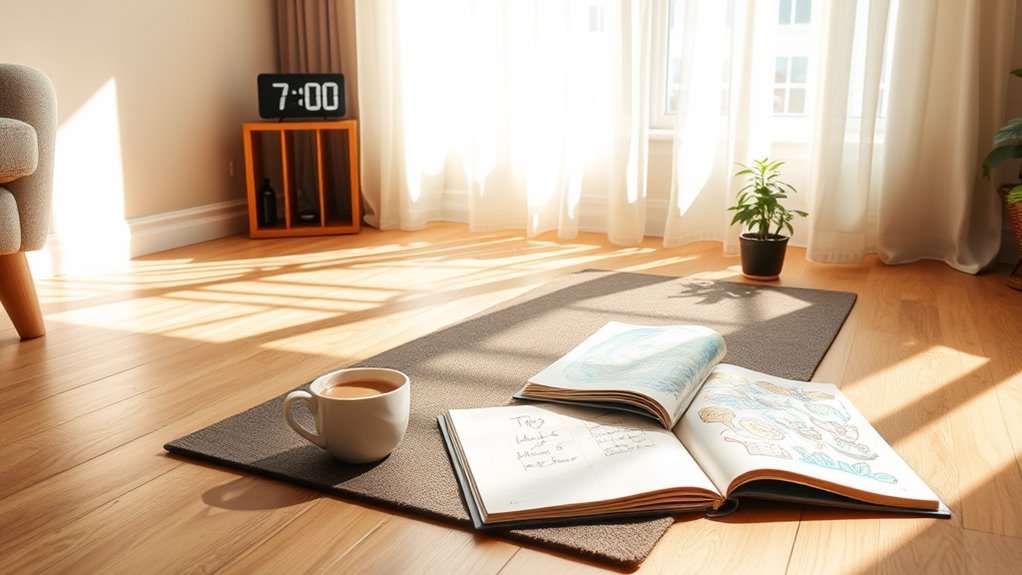Why Prioritizing Sleep Is the Best Self-Care You Can Do
Prioritizing sleep is essential for your self-care. It boosts your immune system and aids in physical recovery, while also enhancing your mood and mental clarity. Good sleep sharpens focus and creativity, leading to better performance in daily tasks. When you get quality rest, you manage stress levels and improve your overall well-being. Plus, a few simple techniques can drastically enhance your sleep quality. Discover how to create the perfect sleep-friendly environment for ideal rest.
Key Takeaways
- Quality sleep enhances overall physical health by supporting immune function and facilitating recovery and healing processes.
- Adequate rest improves mental well-being by regulating mood, cognitive function, and emotional resilience.
- Prioritizing sleep boosts productivity and performance, enhancing focus, creativity, and problem-solving abilities.
- Good sleep hygiene practices can prevent sleep disorders that negatively impact health and daily functioning.
- Investing in sleep leads to better long-term health outcomes and increased overall quality of life.
The Link Between Sleep and Physical Health
While you might know that sleep is essential, you may not fully grasp just how deeply it affects your physical health. Better sleep isn’t just about feeling rested; it plays a crucial role in your body’s recovery and function.
Quality sleep supports your immune system, helping you fend off illness. It regulates hormones that control appetite, aiding in weight management. Insufficient sleep can lead to cardiovascular issues and decreased muscle recovery, which can hamper your physical performance. Additionally, the quality of your sleep directly influences your body’s ability to heal and regenerate.
By prioritizing better sleep, you bolster your overall health, enhance your energy levels, and improve your resilience.
How Sleep Affects Mental Well-Being
Sleep plays a pivotal role in your mental well-being, as it directly influences your mood, cognitive function, and emotional resilience. When you prioritize quality sleep, you enhance your brain’s ability to process information and regulate emotions.
Insufficient rest can lead to irritability, anxiety, and a heightened response to stress, impairing your decision-making and problem-solving skills. Your capacity to focus and retain information diminishes when you’re sleep-deprived, making it harder to achieve your goals.
Additionally, restorative sleep fosters emotional stability, allowing you to respond to life’s challenges with clarity and poise. By committing to a consistent sleep schedule, you empower yourself to cultivate a healthier mindset, ultimately supporting your journey toward mastery in all aspects of life. Engaging in simple nighttime rituals can further enhance your sleep quality, promoting overall well-being.
The Impact of Sleep on Productivity and Performance
Proper rest doesn’t just bolster your mental health; it greatly impacts your productivity and performance as well.
When you’re well-rested, your focus sharpens, and your ability to tackle complex tasks improves. Sleep enhances cognitive functions like problem-solving and creativity, allowing you to approach challenges with innovation and efficiency.
On the flip side, sleep deprivation leads to diminished concentration and slower reaction times, stifling your potential. If you’re aiming for peak performance, every hour of sleep counts; it fuels your energy levels and mental acuity.
Prioritizing quality sleep allows you to harness your fullest capabilities, resulting in better work outcomes and overall satisfaction. Mastery in your field is fueled by the foundational strength of restorative sleep. Additionally, transforming your sleep through practical changes can lead to notable improvements in both health and well-being.
Techniques for Improving Sleep Quality
Improving your sleep quality starts with establishing good sleep hygiene practices. Simple adjustments like setting a consistent bedtime and creating a calming bedtime routine can make a big difference. Incorporating relaxation techniques such as deep breathing or gentle stretching can further enhance your ability to unwind before sleep. Let’s explore some effective relaxation techniques you can try before bed.
Sleep Hygiene Practices
While you mightn’t realize it, the practices you adopt before bedtime can greatly impact your overall sleep quality.
To elevate your sleep hygiene, establish a consistent sleep schedule by going to bed and waking up at the same time daily. Create an inviting sleep environment: keep your bedroom cool, dark, and quiet.
Limit exposure to screens an hour before bedtime, as blue light can disrupt melatonin production. Avoid large meals, caffeine, and alcohol close to bedtime, as these can hinder your ability to fall asleep.
Incorporate restful rituals, like reading or gentle stretching, into your routine. By committing to these practices, you’re setting yourself up for restorative sleep and subsequently, better overall well-being.
Mastering sleep hygiene is a significant step towards your self-care journey.
Relaxation Techniques Before Bed
How can you unwind and prepare your mind and body for rest? Start by establishing a pre-sleep routine that includes deep breathing exercises. Inhale slowly through your nose, hold for a few seconds, then exhale through your mouth. This calms your nervous system, paving the way for relaxation.
Next, consider gentle stretches or yoga to release physical tension. Dimming the lights and engaging in mindfulness meditation can also center your thoughts and diminish anxiety. If you enjoy reading, choose something light—avoid screens to reduce blue light exposure.
Finally, a warm herbal tea, like chamomile, signals your body it’s time to wind down. Mastering these techniques not only enhances your sleep quality but enriches your overall well-being.
Understanding Sleep Cycles and Their Importance
Understanding sleep cycles is essential for reaping the restorative benefits of a good night’s rest. Each night, your body traverses through multiple cycles that include light sleep, deep sleep, and REM sleep.
During light sleep, you drift in and out of consciousness, while deep sleep fosters physical recovery and strengthens your immune system. REM sleep, on the other hand, is vital for cognitive functions, including memory consolidation and emotional processing.
By grasping these stages, you can better plan your sleep to align with your body’s natural rhythms. Aim for 7 to 9 hours of quality sleep, focusing on uninterrupted cycles. Additionally, incorporating bedtime rituals can significantly enhance your overall sleep experience.
Prioritizing your sleep schedule boosts your productivity and enhances overall well-being, making self-care a natural outcome of good sleep hygiene.
Common Sleep Disorders and Their Effects
Sleep quality can be greatly impacted by various sleep disorders, which often disrupt those important sleep cycles we just discussed.
Conditions like insomnia can leave you tossing and turning, impairing your ability to reach restorative deep sleep.
Sleep apnea physically interrupts your breathing, fragmenting your rest and leaving you fatigued during the day.
Restless leg syndrome triggers uncomfortable sensations, making it difficult to relax enough to fall asleep.
Each of these disorders affects not just your sleep, but also your mood, cognitive function, and overall health.
If you suspect you have a sleep disorder, it’s essential to consult a healthcare professional.
Enhancing your sleep hygiene is significant, so you can reclaim the restorative power of sleep and optimize your well-being.
Creating a Sleep-Friendly Environment
Creating a sleep-friendly environment can greatly enhance your ability to unwind and achieve restful slumber.
Here are four vital elements to take into account:
-
Darkness: Use blackout curtains and turn off electronics to block light, creating an ideal atmosphere for sleep.
-
Comfort: Invest in a quality mattress and soft bedding to provide support and warmth, essential for deep rest.
-
Temperature: Maintain a cool room temperature, ideally between 60-67°F (15-19°C), as this range promotes ideal sleep conditions.
-
Sound: Reduce noise distractions with earplugs or a white noise machine, allowing for uninterrupted sleep.
Frequently Asked Questions
How Much Sleep Do Adults Actually Need Each Night?
Adults generally need 7 to 9 hours of sleep each night to function at peak performance. You’ll notice improved concentration, mood, and overall health by hitting that target regularly, making it essential for your well-being.
What Foods Promote Better Sleep Quality?
To promote better sleep quality, incorporate foods rich in magnesium and tryptophan, like almonds, turkey, and bananas. Herbal teas, such as chamomile, can also help you unwind, enhancing your sleep experience naturally.
Can Naps Compensate for Lost Nighttime Sleep?
Naps can help you feel refreshed, but they don’t fully compensate for lost nighttime sleep. Quality nighttime rest is essential; rely on naps cautiously and prioritize a consistent sleep schedule for ideal performance and well-being.
How Does Caffeine Affect Sleep Patterns?
Caffeine disrupts your sleep patterns by blocking adenosine, a neurotransmitter that promotes sleepiness. Consuming it too close to bedtime can lead to difficulties falling asleep and reduced sleep quality, leaving you feeling tired the next day.
What Are the Signs of Sleep Deprivation?
You might notice irritability, difficulty concentrating, fatigue, and changes in appetite when sleep-deprived. Also, you may struggle with decision-making and experience mood swings, signaling that your body desperately needs restorative rest to function efficiently.





